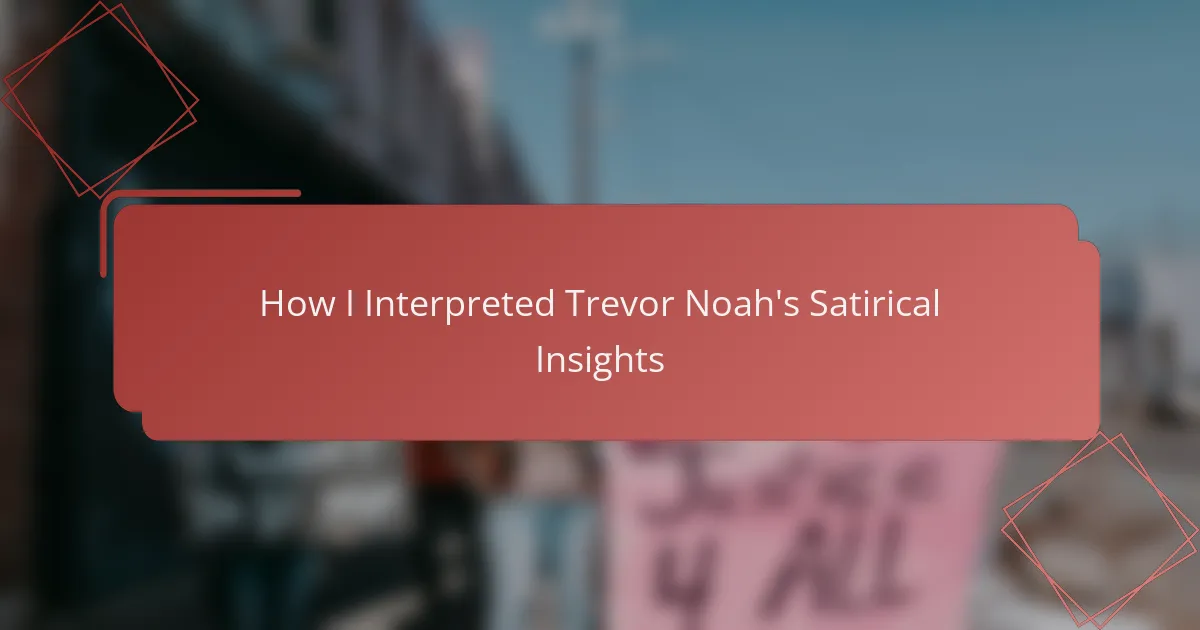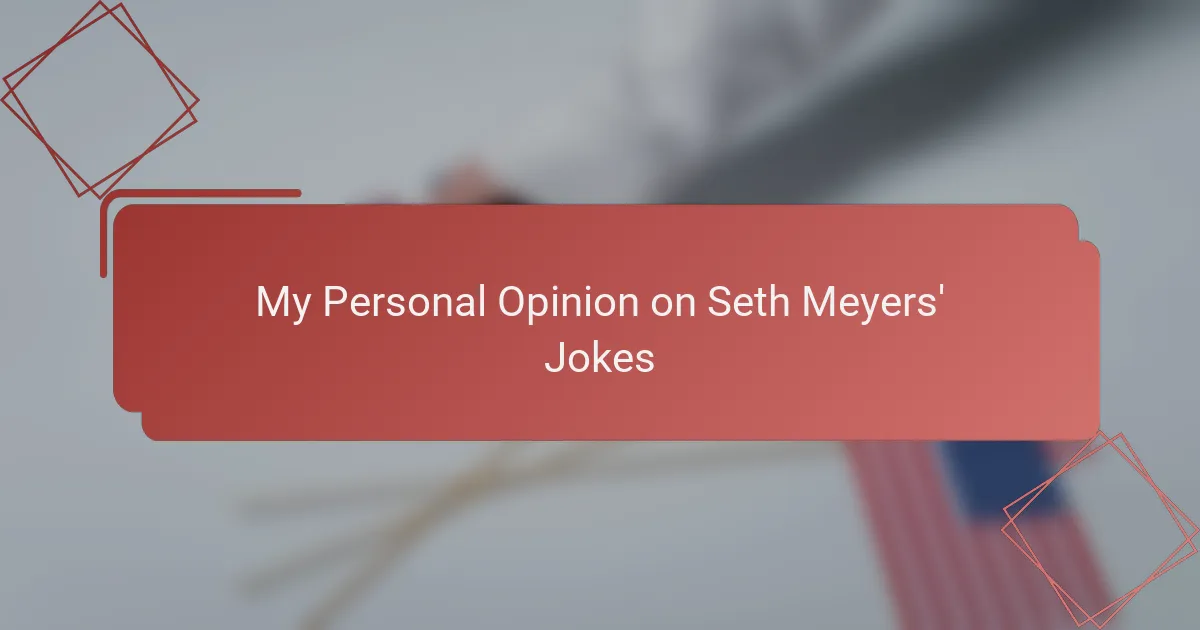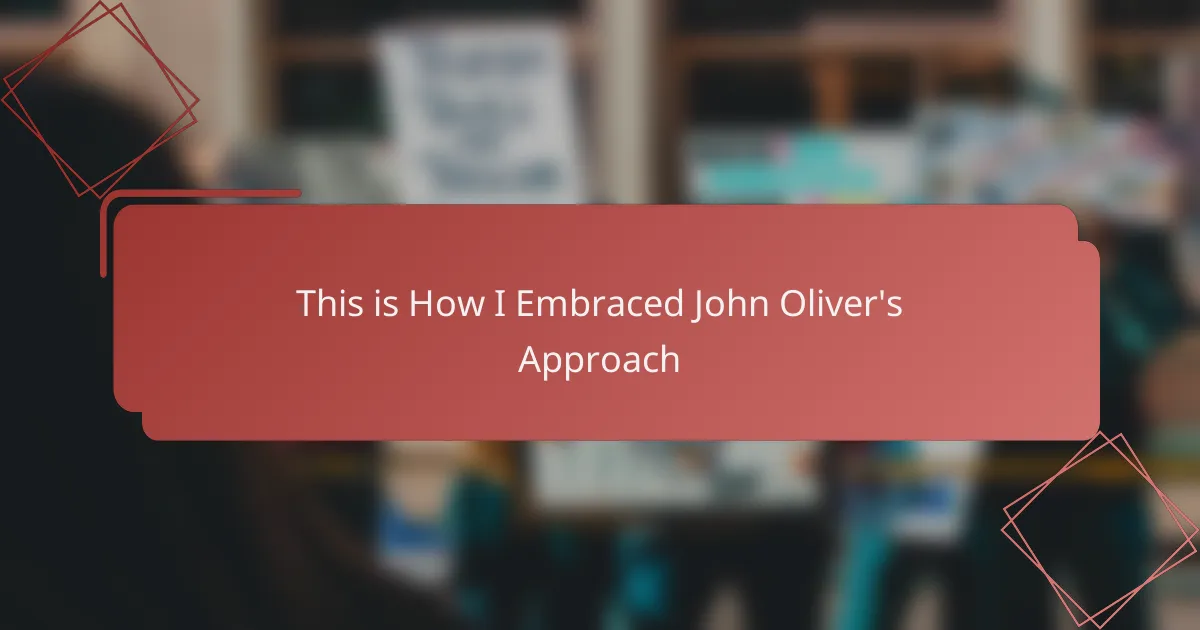Key takeaways
- Political satire, like that of Trevor Noah, uses humor to provoke thought and simplify complex issues, making them more accessible and relatable.
- Noah’s use of irony and exaggeration helps uncover political contradictions while maintaining empathy, engaging audiences emotionally.
- Recurring themes in Noah’s work include identity exploration, critique of power structures, and the humanization of differing perspectives.
- Analyzing satire encourages critical thinking about current events and helps navigate political complexities while fostering empathy and shared humanity.

Understanding Political Satire Basics
Political satire relies on humor to dissect and critique the political landscape. From my experience watching Trevor Noah, I’ve noticed how satire captures complex issues by blending wit with sharp observation. It’s not just about making us laugh; it’s about provoking thought and challenging perspectives.
What strikes me most is how satire can create a safe space for discussing difficult topics. Trevor’s clever use of irony and exaggeration helps me see familiar headlines from a fresh angle, often revealing uncomfortable truths with a light touch. It’s a skill I truly admire and try to understand deeper through this analysis.
- Uses humor as a tool to critique political events and figures
- Employs irony and exaggeration to highlight contradictions
- Simplifies complex political issues without losing depth
- Engages audiences emotionally, making tough topics approachable
- Encourages critical thinking and reflection on current events
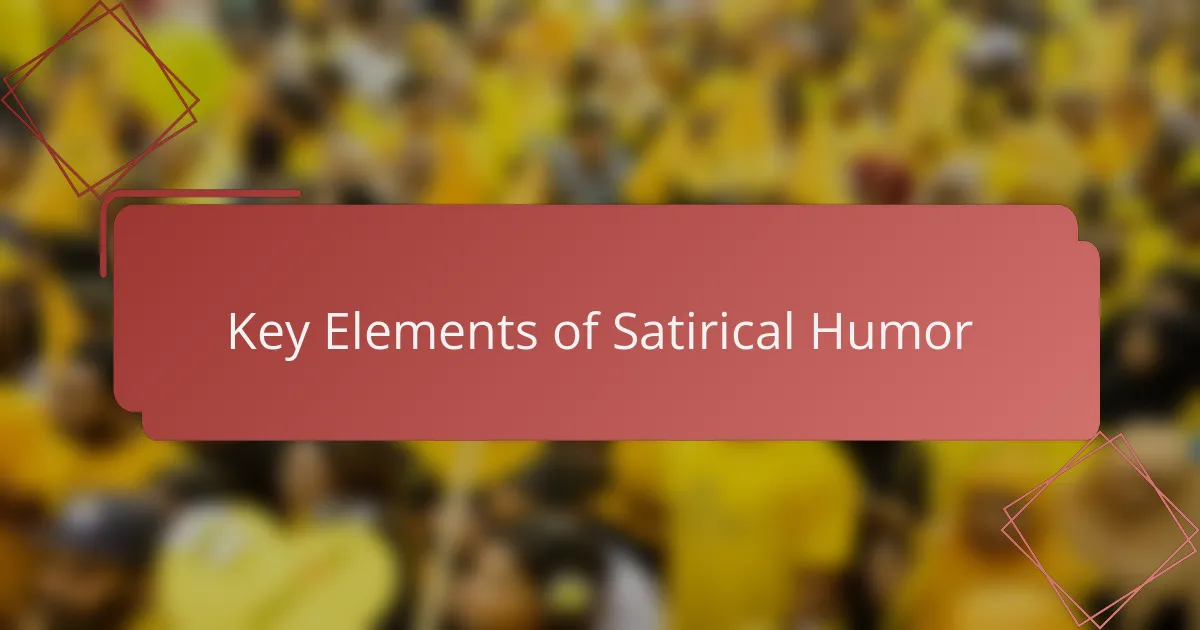
Key Elements of Satirical Humor
Satirical humor, especially in Trevor Noah’s work, cleverly blends wit with sharp social commentary. I’ve noticed he often uses irony to expose contradictions in politics, making complex issues accessible and engaging. This approach not only entertains but also makes me think critically about the topics he discusses.
What stands out to me is how he balances exaggeration and truth, pushing ideas to the edge without losing credibility. His humor feels like a friendly nudge rather than an aggressive attack, which makes the message stick better. I’ve caught myself laughing and then pausing to reflect on the deeper meaning behind his jokes.
| Element | Trevor Noah’s Use |
|---|---|
| Irony | Highlights political contradictions in a witty and relatable way |
| Exaggeration | Amplifies flaws without losing the essence of truth |
| Accessibility | Uses everyday language and cultural references to engage diverse audiences |
| Emotional Balance | Combines humor with empathy to avoid alienating viewers |
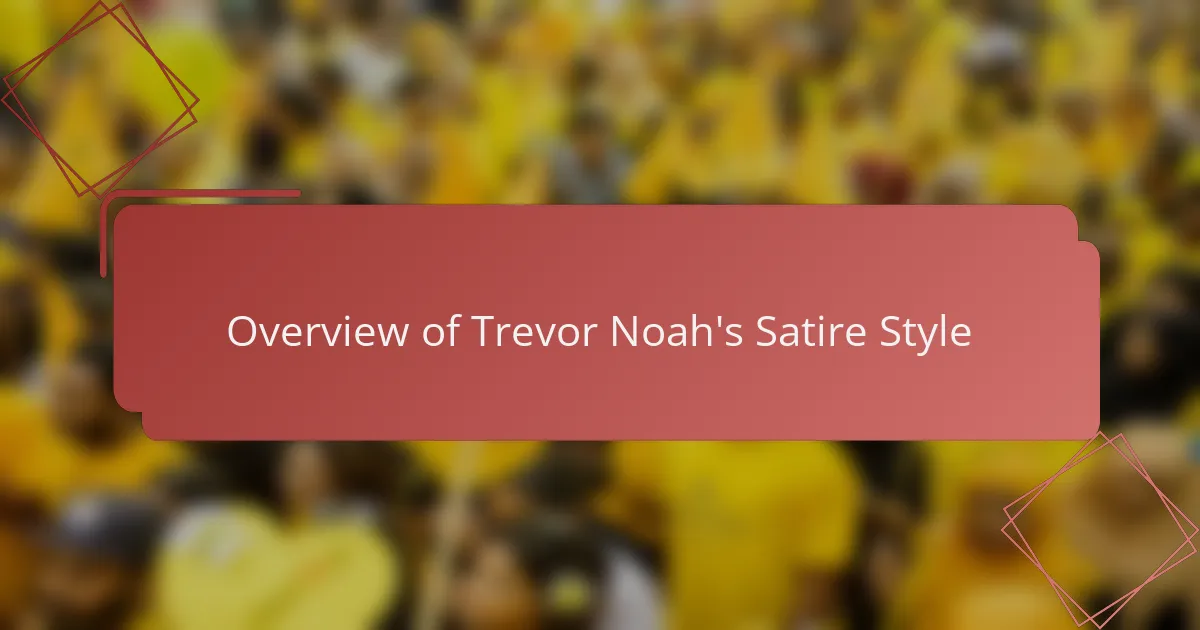
Overview of Trevor Noah’s Satire Style
Trevor Noah’s satire style strikes a balance between sharp wit and approachable storytelling. When I first watched his segments on The Daily Show, I noticed how effortlessly he blends humor with insightful social commentary, making even complex political issues feel relatable. His knack for using personal experiences adds a layer of authenticity that truly resonates with me as a viewer.
What stands out most is his ability to highlight absurdities without coming off as harsh or alienating. This style invites reflection through laughter, which I find both refreshing and effective in today’s divisive political climate. Here are key elements I noticed in his approach:
- Use of personal anecdotes to humanize political topics
- Incorporation of cultural nuances that broaden perspectives
- Balancing irony and sincerity to deepen emotional impact
- Simplifying complex issues without diluting their significance
- Employing a conversational tone that feels like a dialogue, not a lecture
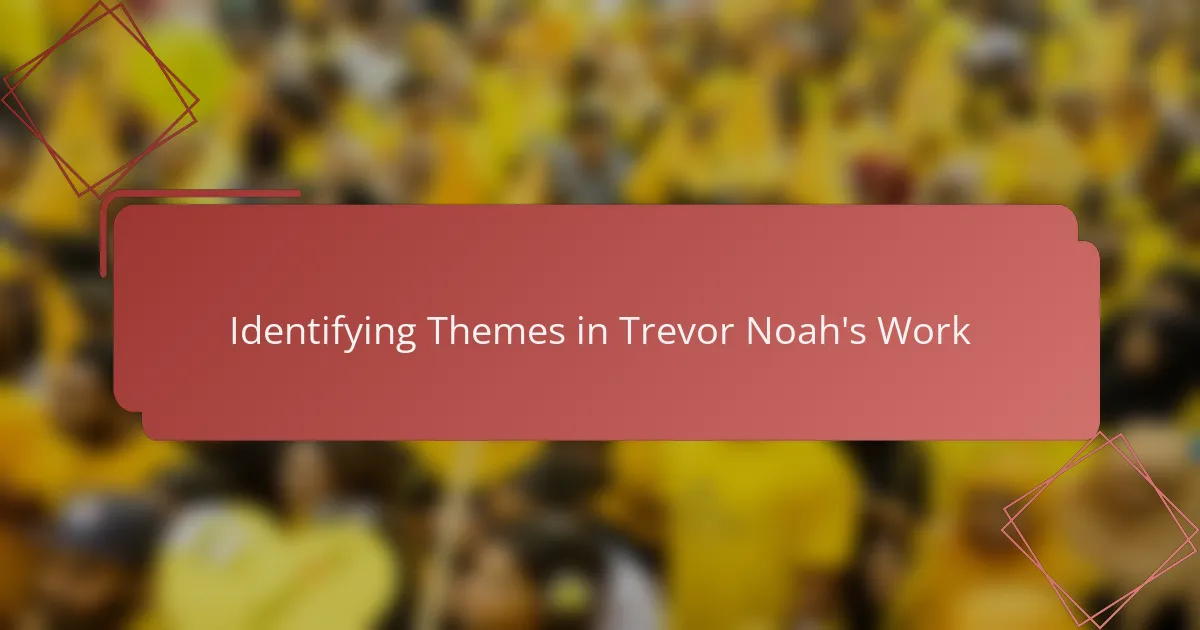
Identifying Themes in Trevor Noah’s Work
I’ve found that one of the recurring themes in Trevor Noah’s work is the exploration of identity and cultural complexity. As someone who shares a multicultural background, I often feel he speaks directly to those caught between worlds, using humor to unpack issues of race, belonging, and globalization. Have you ever noticed how his stories reveal the personal behind the political? That’s no accident—it’s his signature way of making big themes feel intimately real.
Another theme I keep coming back to is his critique of power structures and media influence. Watching Noah, I realize he doesn’t just poke fun at politicians; he digs deeper, exposing how systems perpetuate inequality or misinformation. This sharp awareness challenges me to question what I accept as truth and to look beyond surface-level narratives. Isn’t that the power of satire at its best—opening our eyes while making us laugh?
Finally, I can’t overlook his focus on empathy and humanizing “the other.” Trevor often bridges divides by highlighting common experiences, reminding me that even in political chaos, shared humanity exists. This approach made me think: can humor be a tool for healing in polarized times? For me, his work suggests that satire isn’t just about mockery—it can build connections, too.

Practical Steps to Analyze Satirical Content
When I start analyzing satirical content like Trevor Noah’s, the first step I take is to slow down and really pay attention to the layers beneath the humor. Have you ever caught yourself laughing at a joke, only to realize it’s pointing out something deeply serious or ironic? That moment of pause is crucial—it’s where satire reveals its true power. I try to ask myself: What contradiction or truth is the humor unveiling here?
Next, I focus on the techniques used—irony, exaggeration, or cultural references. For example, Trevor often exaggerates a politician’s behavior just enough to highlight absurdity without turning the joke into a personal attack. By pinpointing these devices, I gain insight into the satirist’s intention and message. It feels like decoding a clever puzzle where each piece leads to a sharper understanding of the issue.
Finally, I reflect on my own emotional response and how the satire shapes it. Does it make me feel empathy, frustration, or skepticism? Recognizing this emotional engagement helps me grasp why the satire resonates and how it encourages me to rethink familiar narratives. Have you noticed how humor can disarm you, making tough subjects easier to digest? That’s exactly the strength satirical analysis taps into.
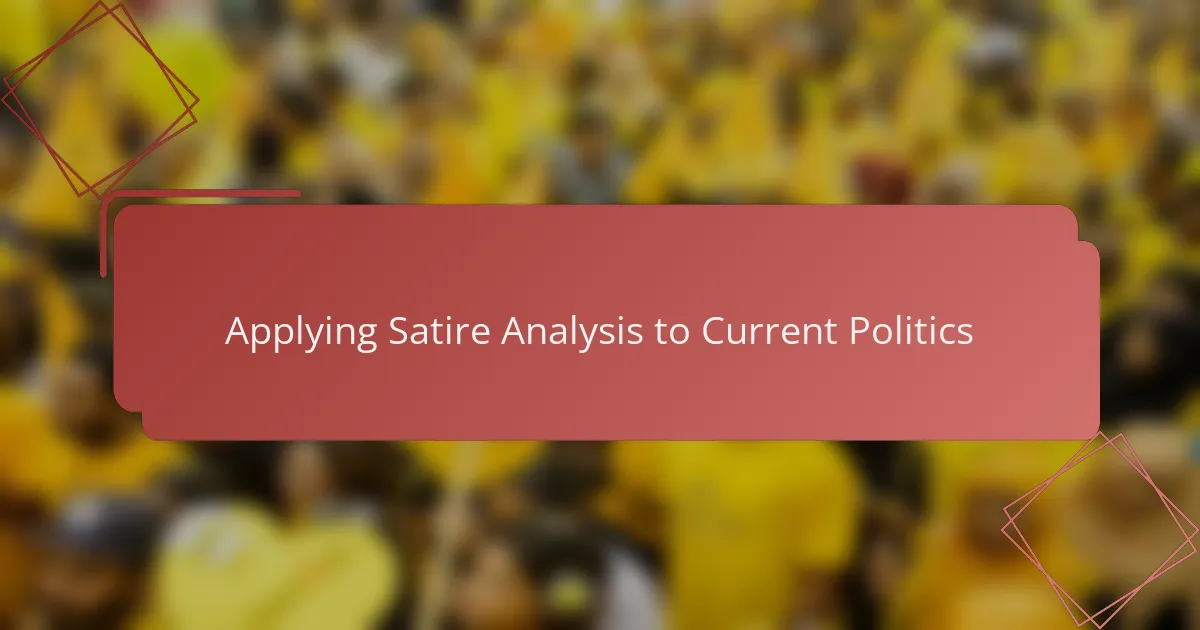
Applying Satire Analysis to Current Politics
Applying satire analysis to current politics has given me a fresh lens through which to view news and debates. When I watch Trevor Noah dissect a political scandal, I don’t just see jokes—I see a strategic unveiling of contradictions that otherwise might go unnoticed. Have you ever wondered why certain political hypocrisies grab your attention only when framed humorously? For me, satire breaks down barriers, making the complex web of politics more understandable and relatable.
One thing I’ve noticed is how satire encourages me to question official narratives without feeling overwhelmed by cynicism. Instead of drowning in dry reports, Trevor’s humor nudges me to think deeper about motivations and consequences. He uses laughter as a gateway to critical thinking, which, in my experience, makes political engagement feel less exhausting and more purposeful.
Moreover, applying this kind of analysis helps me identify when satire crosses from insightful to dismissive. How often do we accept political humor without considering its impact? I’ve learned to appreciate when satire balances critique with empathy—highlighting flaws but also reminding us of our shared humanity. This approach, I believe, is essential for navigating today’s polarized political landscape thoughtfully.
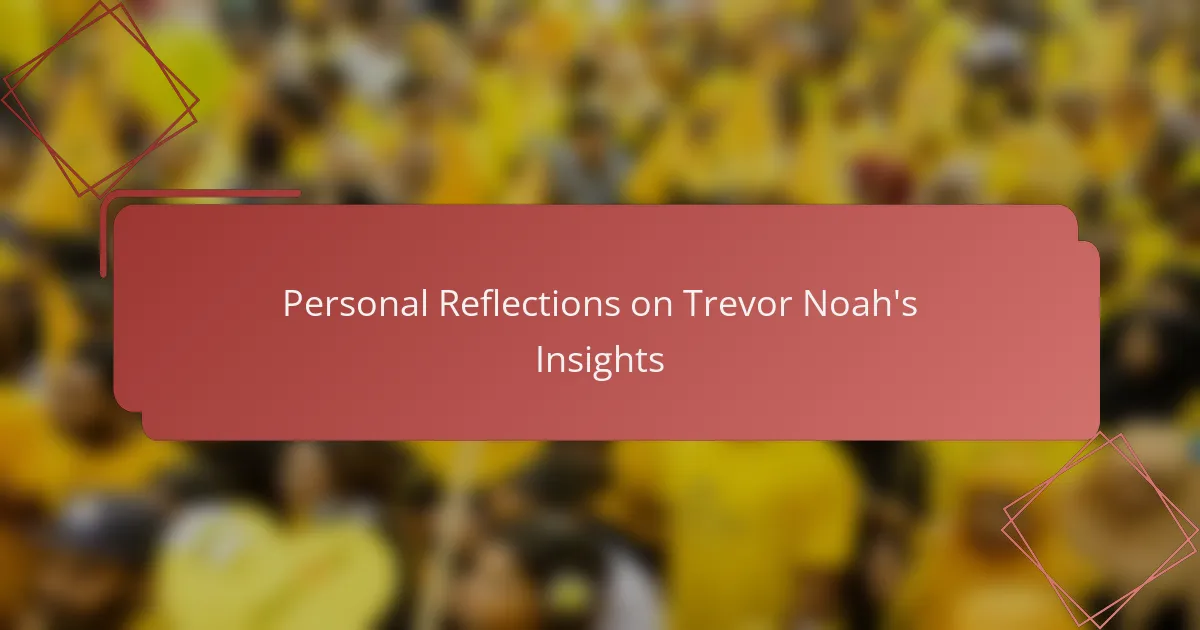
Personal Reflections on Trevor Noah’s Insights
Reflecting on Trevor Noah’s satirical insights, I often find myself struck by how effortlessly he blends humor with heartfelt reflection. There’s a moment when a joke lands, and suddenly I’m not just laughing but also reconsidering my own assumptions about an issue. It’s that blend of wit and vulnerability that makes his satire feel deeply personal to me.
Sometimes, I catch myself revisiting a segment days later, thinking about the layers Trevor peeled back beneath the surface humor. Have you ever experienced that moment when a comedic line suddenly clicks, unveiling a truth you hadn’t fully acknowledged? For me, it’s in those pauses after the laughter that his insights truly resonate.
What really moves me is how Trevor’s perspective invites empathy without preaching—a rare quality in political commentary. I find his approach encourages me to engage with tough subjects more openly, asking difficult questions but also recognizing shared human experiences. It’s this balance that keeps me coming back, eager to see not just the jokes but the stories behind them.
